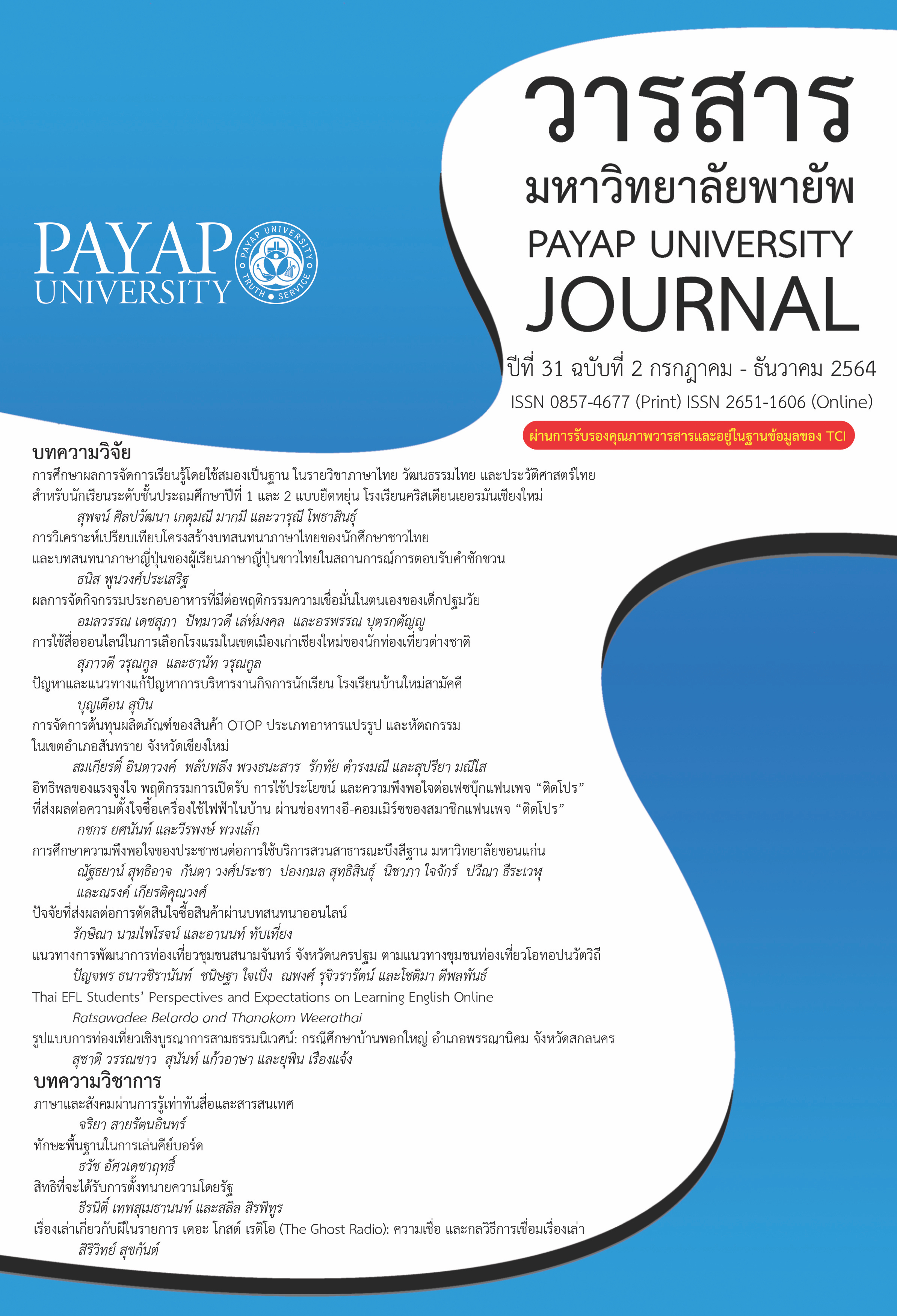มุมมองและความคาดหวังของนักศึกษาไทยที่ใช้ภาษาอังกฤษในฐานะภาษาต่างประเทศที่มีต่อการเรียนภาษาอังกฤษออนไลน์
Main Article Content
บทคัดย่อ
เป้าหมายของงานวิจัยฉบับนี้คือเพื่อสำรวจมุมมองและความคาดหวังของนักศึกษาจำนวน 107 คน จากคณะครุศาสตร์อุตสาหกรรม คณะวิศวกรรมศาสตร์ และคณะบริหารธุรกิจและเทคโนโลยีสารสนเทศ มหาวิทยาลัยราชมงคลอีสาน วิทยาเขตขอนแก่น เกี่ยวกับการเรียนภาษาอังกฤษออนไลน์ เครื่องมือในการวิจัยประกอบด้วยแบบสอบถามที่มีสามส่วน สองส่วนแรกมีเป้าหมายในการสำรวจมุมมองของนักศึกษาต่อการเรียนการสอนออนไลน์และประสิทธิภาพของผู้สอนในการสอนออนไลน์ ส่วนสุดท้ายเน้นไปที่ปัญหาและอุปสรรคต่างๆ ในการเรียนออนไลน์ รวมถึงคำแนะนำจากนักศึกษา ข้อมูลถูกวิเคราะห์ด้วยสถิติเชิงพรรณนา (Descriptive Statistics) และการวิเคราะห์แก่นสาระ (Thematic Analysis)
ผลการวิจัยแสดงให้เห็นว่านักศึกษามีประสบการณ์ในการเรียนวิชาภาษาอังกฤษแบบออนไลน์เชิงบวก โดยมีค่าเฉลี่ย 3.70 มุมมองของนักศึกษาต่อความมีประสิทธิภาพของผู้สอนภาษาอังกฤษแบบออนไลน์เป็นบวกเช่นกัน โดยมีค่าเฉลี่ย 3.87 ซึ่งตรงกับวัตถุประสงค์ข้อแรกของงานวิจัย สำหรับข้อแนะนำจากนักศึกษา ร้อยละ 21.4 ให้คำแนะนำว่าควรจะมีการพัฒนาทางด้านการจัดการห้องเรียนและรูปแบบในการสอนของผู้สอน ซึ่งตรงกับวัตถุประสงค์ข้อที่สองของงานวิจัย จากคำตอบแสดงให้เห็นว่านักศึกษาร้อยละ 21.4 อยากให้การเรียนมีปฏิสัมพันธ์มากกว่าเดิม ซึ่งสรุปได้ว่า แม้นักศึกษามีมุมมองเชิงบวกกับการเรียนการสอนออนไลน์ อย่างไรก็ตาม วิธีการในการสอนออนไลน์ยังคงมีความจำเป็นที่จะต้องพัฒนาด้านความสามารถในการสร้างปฏิสัมพันธ์กับผู้เรียนออนไลน์
Article Details
เอกสารอ้างอิง
Aristika, A., & Juandi, D. (2021). The Effectiveness of Hybrid Learning in Improving of Teacher-Student Relationship in Terms of Learning Motivation. Emerging Science Journal, 5(4), 443-456.
Bennett, D., Knight, E., and Rowley, J. (2020). The role of hybrid learning spaces in enhancing higher education students’ employability. British Journal of Educational Technology, 51(4), 1188-1202.
Dilmurod, R. & Akmal, A. (2020). Distance learning system in the higher education system of Uzbekistan: hybrid technology. In Proceeding of the ICECRS Vol. 6. Conference of management of Islamic education leadership in the era of revolution 4.0, (pp. 150-153). Indonesia: Universitas Muhammadiyah Sidoarjo.
Khodaparast, F., & Ghafournia, N. (2015). The effect of asynchronous/synchronous approaches on English vocabulary achievement: A study of Iranian EFL learners. English Language Teaching, 8(4), 117-127.
Nartiningrum, N., & Nugroho, A. (2020). Online learning amidst global pandemic: EFL students’ challenges, suggestions, and needed materials. ENGLISH FRANCA: Academic Journal of English Language and Education, 4(2), 115-140.
Perveen, A. (2016). Synchronous and asynchronous e-language learning: A case study of virtual university of Pakistan. Open Praxis, 8(1), 21-39.
Phacharuen et al. (2021). Education Disparities of Thai Citizens Studying Age with the Online Learning Situation in the Viral Age Covid-19. PannaPanithan Journal, 6(1), 1-14.
Rockinson-Szapkiw, A. J., & Walker, V. L. (2009). Web 2.0 technologies: Facilitating interaction in an online human services counseling skills course. Journal of Technology in Human Services, 27(3), 175-193.
Saekow, A., & Samson, D. (2011). E-learning Readiness of Thailand’s Universities. International Journal of e-Education, e-Business, e-Management and e-Learning, 1(2), 126-131.
Sathientharadol, P., et al. (2021) Effects of Online Learning in the Epidemic Situation of Coronavirus Disease 2019: A Case Study of Bachelor of Education and Bachelor of Arts Students, Program in English, University of Phayao. Journal of Saengkhomkham Buddhist Studies, 6(3), 423-439.
Son, J. B. (2008). Using Web-based language learning activities. Computer Assisted Language Learning, 4(4), 34-43.
Sukkong, O. (2020). Digital Divide through Individual Factors Analysis. Journal of Liberal Arts, Maejo University, 8(2), 250-265.
UNESCO (2020). COVID-19 educational disruption and response, Retrieved January 31, 2021, from https://en.unesco.org/news/covid-19-educational-disruption-and-response.
Washington, L. D., Penny, G. R., and Jones, D. (2020). Perceptions of Community College Students and Instructors on Traditional and Technology-Based Learning in a Hybrid Learning Environment. Journal of Instructional Pedagogies, 23, 1-11.
Wekke, I. S., Yandra, A., and Hamuddin, B. (2017). Learning Strategy in Class Management: A Reflection from Manado Case. IOP Conference Series: Earth and Environmental Science, 97(1), 1-5.
Wu, D., Bieber, M., and Hiltz, S. R. (2008). Engaging students with constructivist participatory examinations in asynchronous learning networks. Journal of Information Systems Education, 19(3), 321-330.


